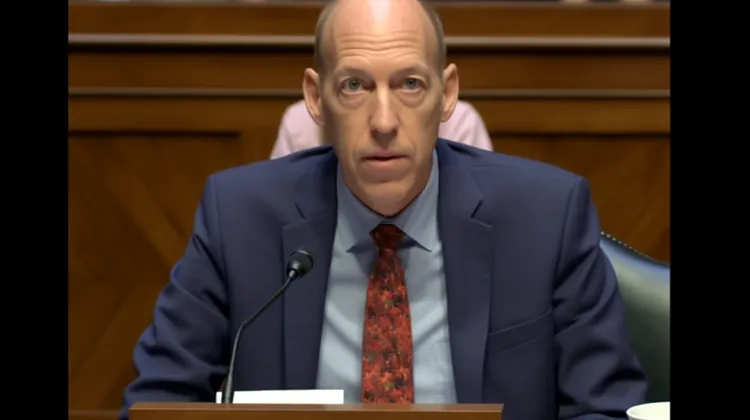
Rep. Warren Davidson Introduces SEC Stabilization Act to Fire Chair Gary Gensler
United States Rep. Warren Davidson has recently presented the SEC Stabilization Act in the House of Representatives, making headlines in the financial and political communities. The bill, announced on June 12, contains several key provisions, with one of the most notable being the proposal to remove Securities and Exchange Commission (SEC) Chair, Gary Gensler from his position. This development has ignited a debate within these circles, raising questions about the motivations behind such a move and the potential consequences it may have on the SEC and its regulatory role.
Representative Davidson’s decision to introduce this bill is significant since it comes at a time when the SEC has been actively involved in overseeing various aspects of the financial markets. Gensler, who has been the SEC Chair since April 2021, has been pushing for stricter regulations on areas such as cryptocurrency, environmental standards, and investor disclosures. While this has earned him praise from consumer advocacy groups, it has also drawn criticism from some industry professionals who argue that these regulations could stifle innovation and hinder market growth.
The SEC Stabilization Act has garnered both support and opposition from lawmakers, with some viewing it as a legitimate effort to maintain a balanced regulatory environment and others perceiving it as a politically motivated move. Rep. Davidson, a member of the House Financial Services Committee, has stated that his aim is to enhance stability in the financial markets by implementing changes to the SEC’s leadership. He believes, based on concerns raised, that Gensler’s policies may be detrimental to market functioning and hinder economic growth.
Critics argue that removing Gensler from his position would undermine the SEC’s independence and politicize the agency’s role. They highlight the importance of allowing the SEC to operate free from political interference in order to carry out its mandate effectively. Gensler, a former Goldman Sachs banker and Chair of the Commodity Futures Trading Commission (CFTC) under the Obama administration, has a reputation for being a strong advocate for investor protection and market transparency. Supporters argue that he brings a valuable perspective to the role and that removing him prematurely would disrupt ongoing initiatives and progress made by the SEC.
The SEC Stabilization Act also contains provisions beyond the dismissal of Gensler. It proposes a number of changes aimed at enhancing accountability and transparency within the agency. This includes requiring the SEC to provide detailed justifications for significant rulemaking proposals and mandating more rigorous cost-benefit analysis of regulatory actions. Proponents argue that these measures are necessary to ensure that the SEC is accountable to the public and considers the economic implications of its decisions.
However, concerns have been raised that the bill may undermine the SEC’s ability to act swiftly and effectively in response to emerging market risks. Critics argue that the required justifications and analyses would lead to lengthy bureaucratic processes, potentially delaying much-needed regulatory actions. Additionally, they caution that removing the current SEC Chair at a time when the agency is actively engaged in addressing numerous market challenges could disrupt continuity and slow down progress on important regulatory reforms.
The SEC Stabilization Act is still in its early stages of consideration, and its ultimate fate remains uncertain. It is unlikely to gain widespread support from Democrats, who hold a slim majority in the House of Representatives, making it difficult for such a bill to pass. Nevertheless, the introduction of this legislation has triggered a broader discussion about the role and future direction of the SEC, as well as the delicate balance between industry innovation and investor protection.
As the debate continues, stakeholders across the financial industry will undoubtedly closely monitor the developments surrounding the SEC Stabilization Act. The outcome of this bill could not only impact the future of SEC leadership but also shape the regulatory environment for years to come. Ultimately, finding the proper equilibrium between market growth and investor protection will require a thorough examination of policy proposals, discussions between industry participants and regulators, and legislative decisions that prioritize the public interest.
10 thoughts on “Rep. Warren Davidson Introduces SEC Stabilization Act to Fire Chair Gary Gensler”
Leave a Reply
You must be logged in to post a comment.
Kudos to all those involved in this important debate on the SEC Stabilization Act. Let’s hope the ultimate decisions prioritize the public interest and find the right balance between market growth and investor protection. 🗳🤝
Requiring justifications and analyses may hinder the SEC’s ability to act swiftly. This bill could do more harm than good.
Removing Gensler would be a huge setback for market transparency. We need someone who will advocate for the public, not just industry insiders.
Why is Davidson so afraid of stricter regulations? It’s about time someone cracked down on the shady practices in the financial industry.
It’s always one step forward, two steps back with these politicians. We need stronger regulations, not weaker ones!
Accountability and transparency are vital, and the provisions in the bill address these concerns. It’s important for the SEC to be accountable to the public and consider economic implications. 💼💡
The fate of the SEC Stabilization Act remains uncertain, but the discussion it has sparked is necessary. We need to examine policy proposals, have open discussions, and prioritize the public interest.
This bill is just another example of politicians playing with our financial system for their own gain. Shameful!
This bill is just a power grab by Davidson to further his own agenda! Removing Gensler is a blatant attempt to undermine the SEC’s independence.
It’s interesting to see the different perspectives on Chair Gary Gensler’s policies. Some argue they could hinder market growth, while others view them as necessary for investor protection and transparency.